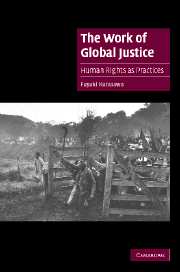Book contents
- Frontmatter
- Contents
- List of figures
- Preface
- Introduction: Theorizing the work of global justice
- 1 A message in a bottle: on bearing witness
- 2 The healing of wounds: on forgiveness
- 3 Cautionary tales: on foresight
- 4 The stranger's keeper: on aid
- 5 Cosmopolitanism from below: on solidarity
- Conclusion: Enacting a critical cosmopolitanism
- References
- Index
- Cambridge Cultural Social Studies
Conclusion: Enacting a critical cosmopolitanism
Published online by Cambridge University Press: 01 December 2009
- Frontmatter
- Contents
- List of figures
- Preface
- Introduction: Theorizing the work of global justice
- 1 A message in a bottle: on bearing witness
- 2 The healing of wounds: on forgiveness
- 3 Cautionary tales: on foresight
- 4 The stranger's keeper: on aid
- 5 Cosmopolitanism from below: on solidarity
- Conclusion: Enacting a critical cosmopolitanism
- References
- Index
- Cambridge Cultural Social Studies
Summary
Toward a substantive conception of global justice
In the preceding chapters, I have put forth a conception of the work of global justice as a substantive alternative to, and line of critique of, the formalist bent of much of the institutional, legal and philosophical literature on human rights. While useful in many regards, formalism supports a logic of attribution of human rights from above, whereby the latter are understood as entitlements prescribed and granted to citizens by official institutions (namely, states and international organizations). What results is a juridification of socio-political action, which formalists equate with or view as principally directed toward legal entrenchment (in national and supra-national constitutions, multilateral treaties, etc.) and institutional recognition of human rights; in other words, from this perspective, struggles for global justice aim first and foremost to bolster legal-political structures and principles that can advance or protect socio-economic and civil-political rights around the world. As I have claimed throughout this book, such a stance reifies human rights by reducing them to things legally and institutionally allocated to subjects according to processes that seemingly operate above their heads. Consequently, these rights are abstracted and divorced from the practices of agents in national and global civil societies, who are engaged in struggles to bear witness, forgive, prevent, assist and cultivate relations of mutuality with others, and in so doing, are enacting global justice through ethico-political labour.
- Type
- Chapter
- Information
- The Work of Global JusticeHuman Rights as Practices, pp. 194 - 210Publisher: Cambridge University PressPrint publication year: 2007

